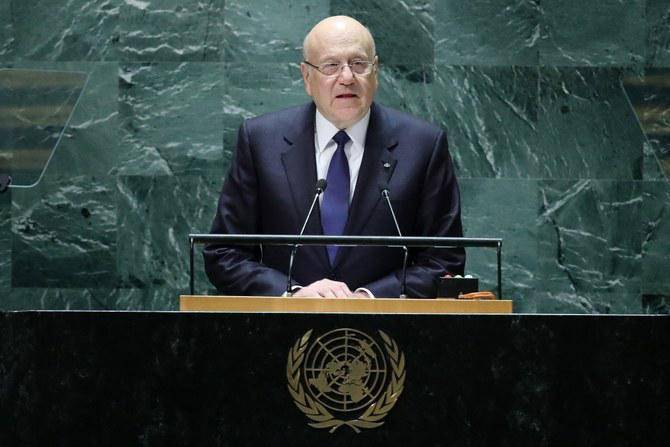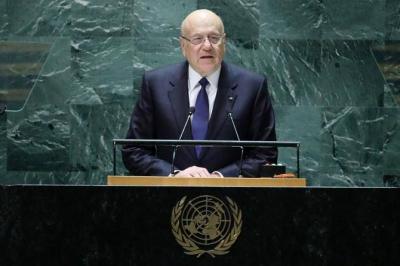On Wednesday, caretaker Prime Minister Najib Mikati noted that "Lebanon is currently grappling with numerous intertwined crises amid a weakened international system and a region filled with tensions and challenges, which weigh heavily on the Lebanese people who suffer daily from losing the basic moral and material components that enable them to endure, compounded by the emigration of brains and youth, and the diminishing spark of hope in the eyes of many Lebanese."
In his speech during the general debate of the United Nations General Assembly, Mikati stated: "Naturally, the first challenge lies in the vacancy of the presidency and the inability to elect a new president for the country, leading to institutional and political instability, exacerbating the economic and financial crisis, and hindering the launch of reform and recovery plans upon which the Lebanese rely to save the country from difficult conditions."
He continued: "I sincerely look forward to the Lebanese parliament exercising its sovereign role by electing a president of the republic in the upcoming period, a president who can unify the Lebanese and uphold the return of the republic through the presidency and constitutional institutions, restoring Lebanon to fulfill its message and play its pioneering role in close cooperation with Arab brothers and friends in the international community. I would also like to commend the role of the quintet committee and the French initiative aimed at assisting in achieving this constitutional entitlement."
Regarding Syrian displacement, the Prime Minister highlighted that "twelve years have passed since the beginning of the Syrian crisis, and Lebanon is still burdened by waves of displacement, the repercussions of which affect all aspects of life and threaten Lebanon's very existence. Despite our vocal advocacy in various international forums, including this gathering, the international community's response to the consequences of this humanitarian tragedy and its implications for us remains shamefully inadequate and ineffective."
He warned again "of the negative impacts of displacement that deepen Lebanon's crises, as Lebanon will not remain alone in the eye of the storm. I also reiterate the call for a roadmap in cooperation with all stakeholders in the international community to find sustainable solutions to the Syrian displacement crisis before its implications escalate beyond control. I would like to document a positive development represented in the agreement reached between Lebanon and the United Nations High Commissioner for Refugees regarding the exchange of information about the Syrian presence in Lebanon," affirming Lebanon's commitment to deepen cooperation with international and UN organizations as a fundamental pillar of the desired sustainable solution.
Mikati stated that "the third challenge is represented by the continued Israeli occupation of areas of our land in the south, along with its daily violations of Lebanese sovereignty and breaches of Security Council Resolution 1701, to which Lebanon affirms its full commitment and respect for all relevant Security Council decisions."
He added: "I take this opportunity to thank all the countries participating in the UNIFIL forces, whose mandate was renewed by the Security Council at the end of August. The mission assigned to these UN forces cannot be completed without close cooperation and continuous coordination with the army, which would contribute to reinforcing peace and security in the region and establishing the Lebanese state's authority over all its territory, including internationally recognized borders."
He noted: "Allow me to express Lebanon's satisfaction with the start of oil and gas exploration in its territorial waters, and its desire to play a constructive role in future energy sectors in the Mediterranean basin."
Mikati expressed his view that "beloved parts of the Middle East witness alarming cases of political and security instability, casting shadows over the region and its peoples, while noteworthy exceptions of stability, development, and growth can be found in the dear Gulf countries, their brotherly peoples, for which Lebanon and its people hold much gratitude and appreciation."
He continued: "The return of the Syrian Arab Republic to practice its membership in the Arab League and the Saudi-Iranian agreement are notable exceptions. However, the Palestinian people still suffer under occupation, struggling to obtain their inalienable human rights. As the need to alleviate the suffering of the Palestinian people increases, we reaffirm our commitment to a comprehensive just peace based on the two-state solution and international references, primarily Security Council resolutions 242 and 338."
Mikati reiterated today the reminder of the Arab Peace Initiative issued from the Beirut Summit in 2002, which proposed the foundations for the desired peace. In this context, as a host country for hundreds of thousands of Palestinian refugees since 1948, Lebanon reminds the international community of its humanitarian and moral responsibility towards the Palestinian refugees and demands full support for UNRWA to enable it to continue its duties, awaiting a final solution.
The Prime Minister noted that "we have always said that the world faces cross-border challenges that require more coordination and cooperation among countries. From climate change to viral pandemics, including security issues, food security, cybersecurity, illegal immigration, extremism, and terrorism, among others. The challenges of a global nature cannot be confronted except through the combined efforts of governments, international organizations, and civil society organizations. Here, we must express our solidarity with the peoples of Libya and Morocco in facing the natural disasters that have struck these two brotherly countries."
He added: "International cooperation based on the principles of partnership and inclusiveness has become vital for the security and well-being of peoples. The United Nations and its specialized agencies stand at the heart of this international effort, contributing to guiding and supporting it with standards and tools."
Mikati pointed out that "in light of the challenges Lebanon faces at the national level, and despite the regional tensions that negatively reflect on it at various levels, it is keen on continuing to play the role expected of it at both the regional and international levels. Lebanon has sought, despite the circumstances it is going through, to continue implementing the 2030 Sustainable Development Goals and the Paris Climate Agreement. It participated actively in the COP27 climate conference in Sharm El Sheikh, Egypt, and looks forward to the same degree of active participation in the COP28 climate conference to be held in Dubai, United Arab Emirates, wishing the brotherly host country and the conference success."
He continued: "I would like to take this opportunity to emphasize to you the importance of having a sovereign, independent, strong, and capable Lebanese state that collaborates with the international community and friendly and brotherly countries, a Lebanese state that protects the parliamentary democratic system and public and private freedoms, and engages in structural reform and the process of strengthening the frameworks of the state of law, citizenship, accountability, and justice; a Lebanese state that believes in tolerance, fraternity, and meeting, and adopts a policy of 'disassociating' itself from 'axes politics'. A Lebanese state is an urgent need for security, peace, stability, and prosperity in the region, and the best way for all of us to cope with changes, mitigate repercussions, and build the future, and confront challenges represented by poverty, unemployment, brain drain, extremism, terrorism, and thus avoid falling into the unknown."
Mikati concluded his speech by recalling the foundations laid by the President as a basis for his vision aimed at leading the current session of the General Assembly. "Peace," "prosperity," "progress," and "sustainability" are indeed broad collective titles for the aspirations of all our countries and peoples. There can be no secure and prosperous future for all of us without realizing those foundations and pillars, which can only be achieved through solidarity, cooperation, and collective action to avoid further wars, conflicts, challenges, humanitarian tragedies, and material and environmental losses.




